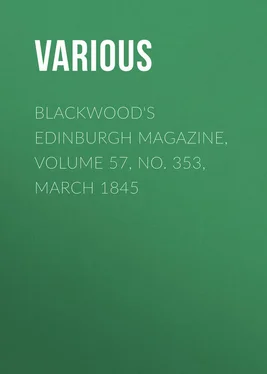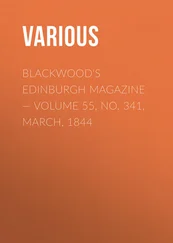Various - Blackwood's Edinburgh Magazine, Volume 57, No. 353, March 1845
Здесь есть возможность читать онлайн «Various - Blackwood's Edinburgh Magazine, Volume 57, No. 353, March 1845» — ознакомительный отрывок электронной книги совершенно бесплатно, а после прочтения отрывка купить полную версию. В некоторых случаях можно слушать аудио, скачать через торрент в формате fb2 и присутствует краткое содержание. Издательство: Иностранный паблик, Жанр: periodic, foreign_edu, Путешествия и география, на английском языке. Описание произведения, (предисловие) а так же отзывы посетителей доступны на портале библиотеки ЛибКат.
- Название:Blackwood's Edinburgh Magazine, Volume 57, No. 353, March 1845
- Автор:
- Издательство:Иностранный паблик
- Жанр:
- Год:неизвестен
- ISBN:нет данных
- Рейтинг книги:5 / 5. Голосов: 1
-
Избранное:Добавить в избранное
- Отзывы:
-
Ваша оценка:
- 100
- 1
- 2
- 3
- 4
- 5
Blackwood's Edinburgh Magazine, Volume 57, No. 353, March 1845: краткое содержание, описание и аннотация
Предлагаем к чтению аннотацию, описание, краткое содержание или предисловие (зависит от того, что написал сам автор книги «Blackwood's Edinburgh Magazine, Volume 57, No. 353, March 1845»). Если вы не нашли необходимую информацию о книге — напишите в комментариях, мы постараемся отыскать её.
Blackwood's Edinburgh Magazine, Volume 57, No. 353, March 1845 — читать онлайн ознакомительный отрывок
Ниже представлен текст книги, разбитый по страницам. Система сохранения места последней прочитанной страницы, позволяет с удобством читать онлайн бесплатно книгу «Blackwood's Edinburgh Magazine, Volume 57, No. 353, March 1845», без необходимости каждый раз заново искать на чём Вы остановились. Поставьте закладку, и сможете в любой момент перейти на страницу, на которой закончили чтение.
Интервал:
Закладка:
The title of the "Englishwoman in Cairo ," would perhaps have more appropriately designated the character of Mrs Poole's volumes than that which she has adopted; since her opportunities of personal observation, after her arrival in the capital from Alexandria, were bounded by the environs of the city, her excursions from which do not appear to have extended further than the pyramids. A considerable portion of the first volume is occupied by an abstract of Egyptian history from the time of the Arab conquest, an account of the foundation of Cairo, an agricultural and general calendar for each month of the year, and various matters connected with the physical features, statistics, &c., of the country. These dissertations form a sort of supplement to the work of her brother, from whose MS. notes they are avowedly taken; being introduced (as Mrs Poole, with much naïveté , confesses) "in the hope of obtaining a more favourable reception for her letters, for the sake of the more solid matter with which they are interspersed;" but though they certainly convey much valuable additional information to the readers of the "Modern Egyptians," they are scarcely "germane to the matter," as interpolations in the work of a lady. The authoress can very well afford to rest her claim to popularity on her own merits; and we prefer to follow her, in her own peculiar sphere, into those mysterious recesses of an Oriental establishment, whither no male footstep can ever penetrate. Mrs Poole is probably the first English lady who has been admitted, not merely as a passing visitor, but as a privileged friend, into the hareems of those of the highest rank in the Egyptian capital. We find her threading the narrow and crowded thoroughfares of Cairo, borne aloft on the "high ass," 15 15 A representation of ladies thus mounted, is found in the Modern Egyptians , Vol. i. p. 240, first edit.
(the usual mode of conveyance for morning calls;) and are introduced to the wives and daughters of the viceroy, and even (in the hareem of Habeeb Effendi) to ladies of the imperial house of Othman, in the ease and disinvoltura of their domestic circles, amid that atmosphere of dolce far niente and graceful etiquette, in which the hours of an Oriental princess appear to be habitually passed. With the exception of Lady Mary Wortley Montague's piquant sketches of the Turkish hareems and their inmates, and the singular narrative of her personal experience of life in an Indian zenana, by Mrs Meer Hassan Ali , 16 16 Observations on the Mussulmans of India , by Mrs Meer Hassan Ali, (Parbury and Allen, 1832.) The authoress of these volumes became, under what circumstances she does not inform us, the wife of a Moslem native of wealth and rank in India, of whose hareem she had been twelve years an inmate, without once having had reason, by her own account, to regret her apparently strange choice of a partner.
we know no female writer who has enjoyed such opportunities for the delineation of the scenes of domestic privacy of the East, and who has so well availed herself of them, as the sister of Mansoor Effendi , in the pages before us.
The narrative opens with the landing of the authoress and her companions at Alexandria in July 1842; but that city, with its double harbour, its quays crowded with a motley assemblage of every nation and language in Europe and the Levant, and the monuments of antiquity in its environs, has been too often described to present too much opportunity for novelty of remark. Passing over, therefore, the details given of these well-known objects, we find the party, after a rapid passage along the Mahmoodiyeh canal in an iron track-boat, drawn by four horses, and a vexatious delay of two days at the junction of the canal and the river, (during which the want of musquitto-curtains gave them an ample foretaste of the quantity and quality of the insect plagues of Egypt,) fairly embarked on the broad stream of the Nile. The voyage to Cairo was performed in a kanjeh , or passage-boat of the kind usual on the river – a long, narrow craft, with two masts, bearing large triangular sails; and Mrs Poole, in common with most travellers arriving for the first time in the East, was greatly impressed by the simple devotion with which the Reyyis (or Arab captain) and his crew commended themselves, on setting sail, to the protection of Providence, by reciting altogether, in a low voice, the short prayer of the Fathah , or opening chapter of the Koran. "The sight of the Muslim engaged in his devotions is, I think, most interesting; the attitudes are particularly striking and impressive; and the solemn demeanour of the worshipper, who, even in the busy market-place, appears wholly abstracted from the world, is very remarkable. The practice of praying in a public place is so general in the East, and attracts so little notice from Muslims, that we must not regard it as the result of hypocrisy or ostentation."
As the kanjeh lay to at night to avoid danger from sand-banks, the travellers were three days in reaching Cairo; and found little to interest them in the contemplation of the banks of the Nile, which at this season are destitute of the brilliant verdure which clothes them for some time after the inundation. On arriving at Boulak, the authoress for the first time shrouded herself in the cumbrous folds of a Turkish riding-dress, "an overwhelming covering of black silk, extending, in my idea, in every direction;" and mounted on a donkey, she followed her janissary guide through the dilapidated suburb, "and at length we fairly entered Cairo… The first impression on entering this celebrated city is, that it has the appearance of having been deserted for perhaps a century, and suddenly re-peopled by persons, unable, from poverty or some other cause, to repair it, and clear away its antiquated cobwebs… I wrote to you that the streets of Alexandria were narrow; they are wide compared to those of Cairo. The meshreebeyehs , or projecting windows, facing each other above the ground floor, literally touch in some instances, and in many , the opposite windows are within reach… After passing through several of the streets, into which it appeared as though the dwellings had turned out nearly all their inhabitants, we arrived at an agreeable house in the midst of gardens, in which we are to take up our temporary residence."
The plan of these gardens, however, intersected by parallel walks, with gutters on each side to convey water into the intermediate squares, was so much at variance with Mrs Poole's English notions of horticulture, that she was almost tempted to conclude, "that a garden in Egypt was not worth cultivation – so much for national prejudice!" As it was indispensable for the health of the children that their residence should be fixed in the outskirts of the city, some delay was experienced in finding a permanent abode; but at the end of a month they considered themselves fortunate in engaging a house "infinitely beyond the usual run," in the most healthy and cheerful quarter, for which the rent demanded by the landlady, (who bore the picturesque name of Lalah-Zar, or Bed of Tulips ,) was only L.12 per annum. The arrangement of the apartments was nearly as described by Mr Lane in his account of the private houses in Cairo – ( Modern Egyptians , i. p. 11:) on the ground-floor a court, open to the sky, round which were the rooms appropriated to the male inhabitants, while a gallery, running round the first floor, conducted to the hareem, consisting of two principal apartments, and "three small marble paved rooms, forming en suite an antechamber, a reclining chamber, and a bath. Above are four rooms, the principal one opening to a delightful terrace, considerably above most of the surrounding houses, and on this we enjoy our breakfast and supper under the clearest sky in the world." But scarcely had the establishment been removed into this new residence, when it became evident that something was not right . The two maid-servants, Amineh and Zeyneb, disappeared one after the other without giving warning – strange noises were heard, which were at first ascribed to the wedding rejoicings of a neighbour, but an explanation was at last elicited from the doorkeeper. The house was haunted by an 'Efreet, (ghost or evil spirit,) in consequence of the murder of a poor tradesman and two slave girls by the previous owner, who had bequeathed it to Lalah-Zar, with reversion (perhaps in hope of expiating his crimes) to a mosque. One of the victims had perished in the bath, and like Praed's 17 17 Knight's Quarterly Magazine , ii. 414, a talented but shortlived periodical, chiefly by members of the University of Cambridge, to which Praed was a principal contributor under the assumed signature of Peregrine Courtenay.
Abbess of St Ursula, who
Интервал:
Закладка:
Похожие книги на «Blackwood's Edinburgh Magazine, Volume 57, No. 353, March 1845»
Представляем Вашему вниманию похожие книги на «Blackwood's Edinburgh Magazine, Volume 57, No. 353, March 1845» списком для выбора. Мы отобрали схожую по названию и смыслу литературу в надежде предоставить читателям больше вариантов отыскать новые, интересные, ещё непрочитанные произведения.
Обсуждение, отзывы о книге «Blackwood's Edinburgh Magazine, Volume 57, No. 353, March 1845» и просто собственные мнения читателей. Оставьте ваши комментарии, напишите, что Вы думаете о произведении, его смысле или главных героях. Укажите что конкретно понравилось, а что нет, и почему Вы так считаете.












